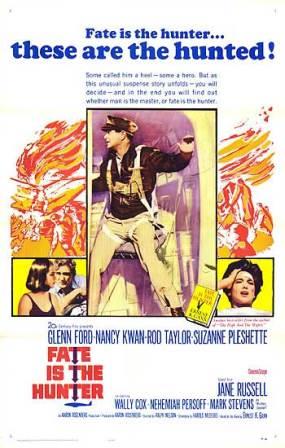Sam McBane played with death to prove a theory.
Fate Is the Hunter had at the time, and still has, a lot going for it—a string of first-class major stars of the day, a diverse supporting cast, music by Jerry Goldsmith and Oscar-nominated cinematography by Milton Krasner. Just because its plot greatly deviated from the novel, causing an outcry from critics and prompting its author, Ernest K. Gann, to withdraw his name from the credits, doesn’t mean the resulting film isn’t worthwhile. Not great, of course; simply good entertainment.
Writer Gann was also an aviator, sailor and conservationist. His experiences as an airline pilot before World War II and as a wartime volunteer in the U.S. Army Air Forces, including flying “The Hump” airlift across the Himalayas into China, provided material for a number of aviation-themed works. Fate Is the Hunter is probably the best of his novels, which include Island in the Sky and The High and the Mighty, both made into John Wayne films in 1953 and 1954.
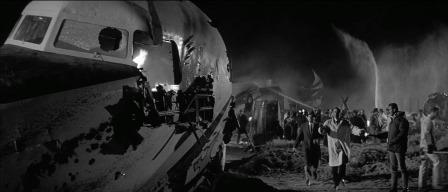 Despite having recently reviewed a Glenn Ford film (Experiment in Terror), I decided another article, even this soon afterward, would still be appropriate for this now, if not forgotten, then grossly neglected actor. Ford provided any number of fine screen portrayals in a variety of film genres—maritime sagas, innumerable Westerns, a few comedies where he held his own, a high school teacher in Blackboard Jungle (1955) and a surprising number of airplane and space disaster films.
Despite having recently reviewed a Glenn Ford film (Experiment in Terror), I decided another article, even this soon afterward, would still be appropriate for this now, if not forgotten, then grossly neglected actor. Ford provided any number of fine screen portrayals in a variety of film genres—maritime sagas, innumerable Westerns, a few comedies where he held his own, a high school teacher in Blackboard Jungle (1955) and a surprising number of airplane and space disaster films.
Which brings up Fate Is the Hunter. Always stalwart—well, usually always—Ford displays here his most stern attitude, determined, resolute and persistent in his beliefs, all rooted in humorless sincerity. So intent, so serious is he in his investigation into the causes of a plane crash that he’s indifferent to everything else, including a barroom waitress and, later, a girl at a party who bids for his attention. His confidence in himself, however, and in his convictions, and in this case in his knowledge of airplanes, deserts him, causing much embarrassment for himself and his company.
A plane of Consolidated Airlines crashes and explodes on a beach five minutes after takeoff. The confluence of so many freak occurrences suggests that the accident must have been—had to be—caused by luck or . . . what’s the word? . . . FATE.
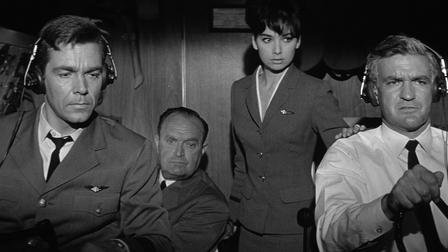 Bird feathers from shore birds that usually don’t inhabit beaches were found in the failed right engine. Rare, three off-schedule planes circling to land prevented an immediate emergency landing for Flight 22. The crash’s only survivor, a stewardess, swears she saw the control panel light flash, warning that the second engine also had failed, but evaluation afterward proved it to be perfectly all right. What really doomed the aircraft was the unexpected pier which was to have been demolished the next day.
Bird feathers from shore birds that usually don’t inhabit beaches were found in the failed right engine. Rare, three off-schedule planes circling to land prevented an immediate emergency landing for Flight 22. The crash’s only survivor, a stewardess, swears she saw the control panel light flash, warning that the second engine also had failed, but evaluation afterward proved it to be perfectly all right. What really doomed the aircraft was the unexpected pier which was to have been demolished the next day.
Against these portents of fate were rumors that the pilot, known as a drinker and ladies’ man, had been seen in a bar a few hours before the flight.
When he begins his search for the truth, and throughout interviews with people who knew the pilot, Sam McBane (Ford), flight operations director at Los Angeles Airport, insists that he doesn’t believe in luck, or fate, or “the will of God.” He fervently denies the allegations of pilot error that persist when all other explanations have been eliminated; there has to be a logical explanation, mechanical or electrical, why the plane crashed.
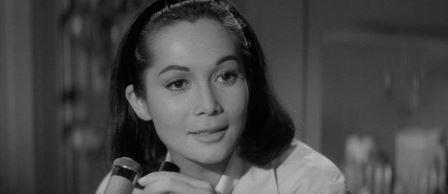 Ford’s only competition for screen time is the ever-charming Rod Taylor, surely one of the most likable screen actors. Now as pilot Captain Jack Savage and earlier McBane’s wartime buddy, Taylor assumes the similar persona of the happy-go-lucky Mitch Brenner in Alfred Hitchcock’s The Birds made the year before.
Ford’s only competition for screen time is the ever-charming Rod Taylor, surely one of the most likable screen actors. Now as pilot Captain Jack Savage and earlier McBane’s wartime buddy, Taylor assumes the similar persona of the happy-go-lucky Mitch Brenner in Alfred Hitchcock’s The Birds made the year before.
Ford and Taylor are ably supported, more so than in most pictures of the time, by first-class co-stars. Nancy Kwan is Sally Fraser, a girlfriend of Savage’s. Although devoted to the charismatic pilot, she counters McBane’s quite different contentions and accepts his death without tears, as unalterable fate, that “a divine operation, a plan” is at work beyond human control.
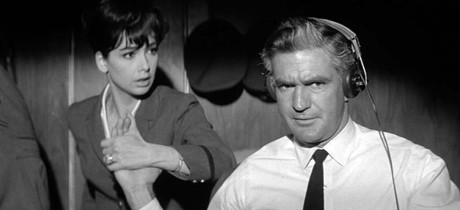 Suzanne Pleshette, as the lone crash survivor Martha Webster, warns fellow stewardess, new on Flight 22, about the boarding Captain Savage, who immediately eyes her. With that name, Martha, it can be assumed—correctly—that she will not be allowed any romantic relationships during the film. Nor are there any other serious liaisons, except for Jack Savage’s stabilizing interest in Sally.
Suzanne Pleshette, as the lone crash survivor Martha Webster, warns fellow stewardess, new on Flight 22, about the boarding Captain Savage, who immediately eyes her. With that name, Martha, it can be assumed—correctly—that she will not be allowed any romantic relationships during the film. Nor are there any other serious liaisons, except for Jack Savage’s stabilizing interest in Sally.
Wally Cox plays timid Ralph Bundy, Savage’s radio operator during WWII. When McBane looks up Ralph during his investigation, Ralph relates in a flashback a revealing and unknown incident. When their bomber is about to crash, Captain Savage orders everyone to bail out, including co-pilot McBane. Savage will jump at the last minute. Later, when McBane and the other parachutists are picked up and returned to the base, there awaits the bomber, Jack and Ralph. The flashback ended, Ralph tells McBane he was too frightened to jump, so Jack stayed on board. Although the plane lacked the power to clear a mountain range, Jack miraculously found a valley and lands and, in the process, swears Ralph to secrecy as to why he stayed aboard.
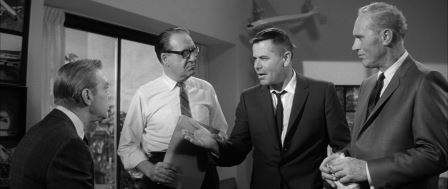 Nehemiah Persoff, airline executive Ben Sawyer, fluctuates between a good and a bad guy. In contention with McBane for the vice presidency of the company, the animosity between them is clear, often because of McBane’s wrong-headed accusations.
Nehemiah Persoff, airline executive Ben Sawyer, fluctuates between a good and a bad guy. In contention with McBane for the vice presidency of the company, the animosity between them is clear, often because of McBane’s wrong-headed accusations.
Constance Towers as a secretary and friend of McBane is somewhat lost in the shuffle. Neither seems to ignite any romantic interest in the other. In a considerably larger role, she’s probably best remembered as Miss Hannah Hunter of Greenbriar in John Ford’s The Horse Soldiers(1959).
An array of supporting old favorites fills out the roster, easily recognized, if not always by name. Robert J. Wilke, one of the four men who come gunning for Gary Cooper in High Noon (1952), is no longer the resident villain, but here Stillman, president of Consolidated Airlines. Robert F. Simon, a lesser airline executive, kind of blends into the background. He is well remembered by some, however, as General Maynard M. Mitchell, “about as interesting as a five-pound bag of fertilizer,” in three episodes of TV’s M*A*S*H. Mary Wickes has a long, juicy scene as Savage’s gossipy landlady. Max Showalter plays an aggressive TV reporter, and Glenn Ford’s son, Peter, is briefly seen as an airline attendant.
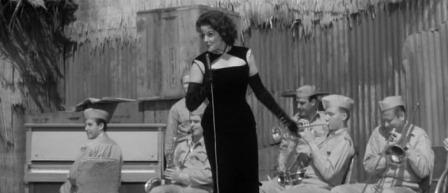 Submerged in the plot are two guest appearances, although not so listed. In a flashback, Jane Russell plays herself in two brief, related scenes, as an entertainer, first singing “No Love, No Nothin’ ” by Rodgers and Hart to WWII GIs. In her second scene, she arrives in a jeep with Savage just before a flight, Jack with her garter as a souvenir of the evening. Dorothy Malone is an insensitive party girl, who, if anything, proves a negative witness in McBane’s search to prove his pilot innocent, declaring Savage “irresponsible” and “unreliable.”
Submerged in the plot are two guest appearances, although not so listed. In a flashback, Jane Russell plays herself in two brief, related scenes, as an entertainer, first singing “No Love, No Nothin’ ” by Rodgers and Hart to WWII GIs. In her second scene, she arrives in a jeep with Savage just before a flight, Jack with her garter as a souvenir of the evening. Dorothy Malone is an insensitive party girl, who, if anything, proves a negative witness in McBane’s search to prove his pilot innocent, declaring Savage “irresponsible” and “unreliable.”
Throughout, McBane has been in search, without success, of a Mickey Doolan, reported to have been seen with Savage in various bars the night before the crash. Unexpectedly, haggard and unshaven, Doolan (Mark Stevens) shows up in the hanger where the wreckage of Flight 22 is assembled and is being examined.
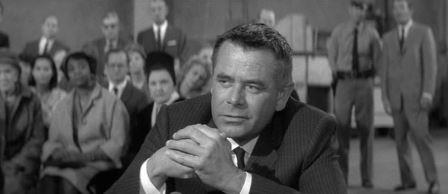 In flashback, Doolan relates to McBane another example of Savage’s flying expertise and, perhaps too, his happy-go-luck attitude toward life. Doolan is Savage’s co-pilot. They are flying over Greenland, lost in a fog, looking for a place to land, soon to crash otherwise. “Field’s at the end of this fjord,” Jack says. “Mind telling me how you know that?” “I don’t know. It’s got to be. We’re out of fuel.” Sure enough, the fog breaks and there is a clearing.
In flashback, Doolan relates to McBane another example of Savage’s flying expertise and, perhaps too, his happy-go-luck attitude toward life. Doolan is Savage’s co-pilot. They are flying over Greenland, lost in a fog, looking for a place to land, soon to crash otherwise. “Field’s at the end of this fjord,” Jack says. “Mind telling me how you know that?” “I don’t know. It’s got to be. We’re out of fuel.” Sure enough, the fog breaks and there is a clearing.
“Sure Jack bought a dozen drinks that night,” Doolan tells McBane, “but they were all for me.” He swears he’ll testify at the inquiry.
When Doolan doesn’t appear, McBane is left on his own, now violating his own convictions. Since sabotage and mechanical error have been eliminated and, now, with the vindication of Jack Savage, human error as well, McBane concludes it’s the supernatural, those old bugaboo excuses, luck and fate. “For some reason or other,” he says, “the time had come for their lives to close.” Shocked, Consolidated Airline higher-ups dissociate themselves from their flight operations director, his job now in jeopardy.
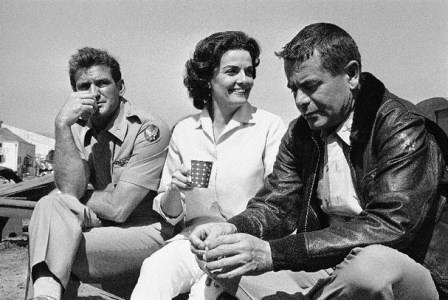 In desperation, McBane says he wants to re-enact the flight—same kind of plane, same take-off time, same weight, using bags of sand to duplicate the weight of the passengers. “This is the first time I’ve ever heard of shipping sand by air,” comments one of the laborers. At first Martha Webster, still traumatized by her experience, refuses to play the stewardess, but decides at the last minute to board a plane again.
In desperation, McBane says he wants to re-enact the flight—same kind of plane, same take-off time, same weight, using bags of sand to duplicate the weight of the passengers. “This is the first time I’ve ever heard of shipping sand by air,” comments one of the laborers. At first Martha Webster, still traumatized by her experience, refuses to play the stewardess, but decides at the last minute to board a plane again.
Against a voice recording of Savage’s pilot/tower communications, McBane, now the pilot, follows, minute-by-minute, the progress of the original flight. Martha even brings McBane a cup of coffee at about the time she had given Savage a cup, which he sat on the control panel between the pilot and co-pilot. McBane does the same. When nothing has happened at the given time of Savage’s problems, the tower orders the plane back.
Shortly, however, an engine explodes, jarring the plane and spilling, once again, the coffee on the control panel (as the camera had shown with Flight 22). Then a second flashing light warns of the failure of the other engine. As McBane prepares everyone for an emergency landing, he abruptly says, “No, that second engine is all right. So was Jack’s, but he didn’t know that.”
Turns out, the coffee had spilled between a seam in the control panel, causing a short and triggering a false signal about the second engine. The plane safely lands and Stillman suggests to McBane that “we have something to talk about.” Total vindication, no doubt for McBane—and that vice presidency, perhaps.
